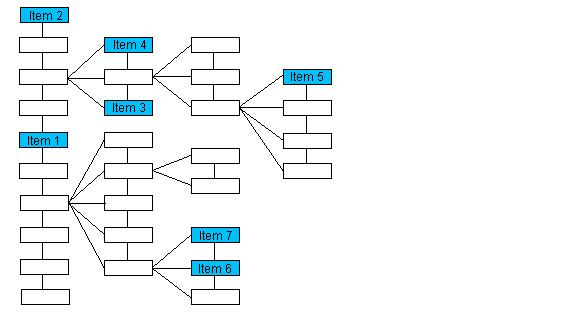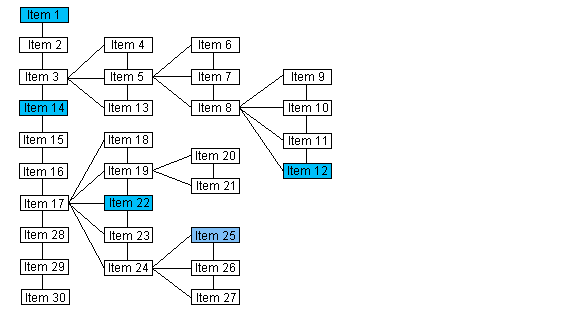
|
Available in LEADTOOLS Medical Imaging toolkits. |
LDicomDS::GetFirstKey
#include "ltdic.h"
pDICOMELEMENT LDicomDS::GetFirstKey(pElement, bTree)
|
pDICOMELEMENT pElement; |
/* pointer to a DICOMELEMENT structure */ |
|
L_BOOL bTree; |
/* flag that indicates how to evaluate the Data Set */ |
Returns a pointer to the first item in the Dicom Dir Data Set.
|
Parameter |
Description |
|
|
pElement |
Pointer to a DICOMELEMENT structure within the Data Set. A pointer to the DICOMELEMENT structure that contains the first item in the Data Set will be returned. |
|
|
bTree |
Flag that indicates how the Data Set will be evaluated. Possible values are: |
|
|
|
Value |
Meaning |
|
|
TRUE |
Evaluate the Data Set as a tree. |
|
|
FALSE |
Evaluate the Data Set as a list. |
Returns
|
!NULL |
A pointer to a DICOMELEMENT structure that contains the first item in the Data Set. |
|
NULL |
The Data Set is empty. |
Comments
If the Data Set is evaluated as a tree structure, this function returns the first item on the same level as pElement with the same parent as pElement. Please note that the numbering of the items in this first illustration is arbitrary and does not imply order.

|
If the passed pointer points to : |
The function returns a pointer to : |
|
Item 1 |
Item 2 |
|
Item 3 |
Item 4 |
|
Item 5 |
Item 5 |
|
Item 6 |
Item 7 |
|
NULL |
Item 2 |
If the Data Set is evaluated as a list, the first item in the list is returned. Please note that the numbering of the items in this illustration does indicate the order of the items when the Data Set is evaluated as a list.

|
If the passed pointer points to : |
The function returns a pointer to : |
|
NULL |
Item 1 |
|
Item 12 |
Item 1 |
|
Item 14 |
Item 1 |
|
Item 22 |
Item 1 |
|
Item 25 |
Item 1 |
The following functions will also help you navigate the Data Set as either a tree or a list:
If you evaluate the Data Set as a tree, you can also use the following functions to navigate the tree:
Required DLLs and Libraries
|
LTDIC For a listing of the exact DLLs and Libraries needed, based on the toolkit version, refer to Files To Be Included With Your Application |
See Also
Example
For an example, refer to LDicomDS::InsertKey.